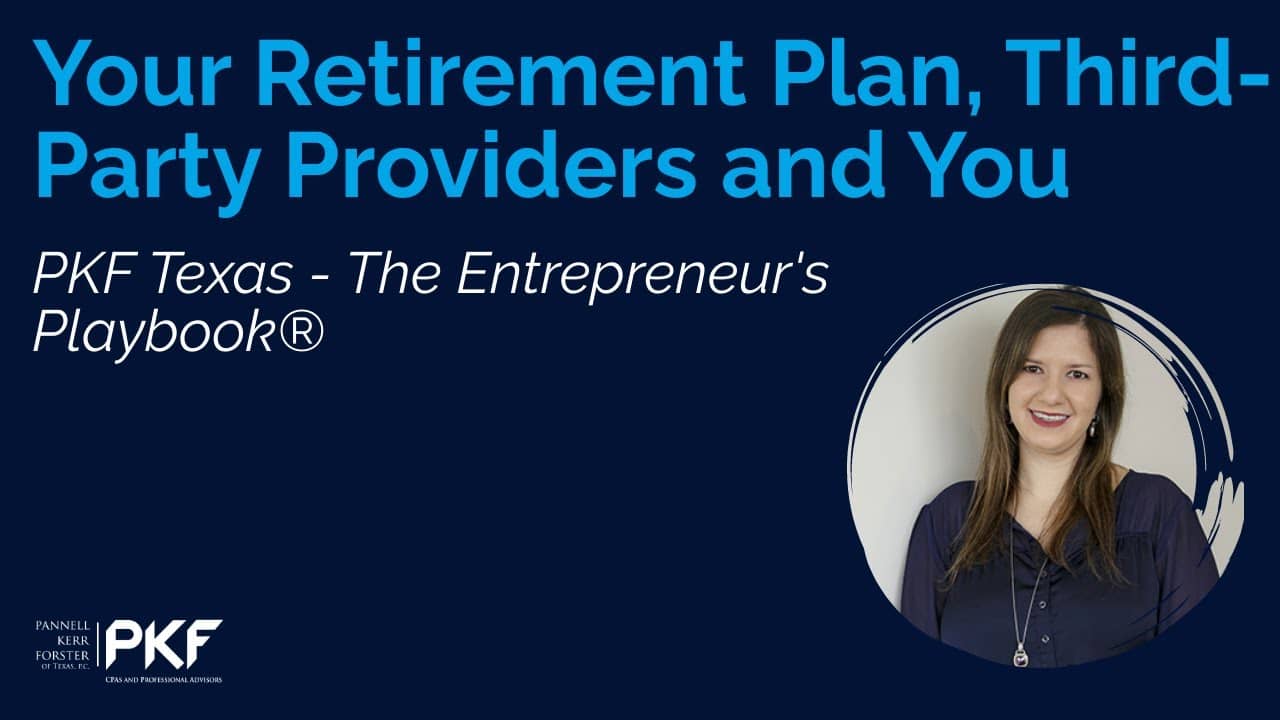Jen: This is the PKF Texas – Entrepreneur’s Playbook®, I’m Jen Lemanski, and I’m here with Kelly McDonald, an audit manager and a member of our employee benefit plan audit team. Kelly, welcome to the Playbook.
Kelly: Good to be here.
Jen: So, I know there’s a lot of ins and outs with EBPs, and so one question that I have is, how can third-party providers help companies with fiduciary responsibilities in relation to their retirement plans?
Kelly: So, a company will normally – or we encourage them to – contract with an investment advisor or a retirement plan consultant to help with diversification of their investments, as well as to help make sure their plan expenses are reasonable in terms of the size of their plan. And also to help with compliance with laws and regulations as it relates to their plan.
And there’s also a lot of times a company, when they’re setting up their retirement plan, they will have a third-party administrator to help with the daily transactions and ins and outs of their plan. They also can help with provisions of the plan, such as hardship and cash out distributions. And service providers these days… they almost can provide help – payroll, 401k, investment advisory, compliance, etc., which is a great resource for a company. However, this can lead to over-reliance on a company when it comes to compliance.
In terms of when I’ve done audits, I will request support for maybe certain required notifications that are supposed to be sent to plan participants or ensuring transactions are in compliance with the plan itself and the documents that outline it. And unfortunately, there are instances where maybe it wasn’t available or wasn’t correct. And the response from the company is, “Well, my third-party service provider provides this.” And unfortunately, that doesn’t pass muster, because the company is still the ultimate fiduciary; they are the responsible ones in terms of the plan. So, they hold the liability for any errors that may be held by the third-party service provider.
Jen: So, what can a company do to mitigate that liability with those third-party service providers?
Kelly: One thing that they can do is to obtain identification. So, in most contracts with these service providers, they will discuss gross negligence, but not ordinary negligence. So, in cases of errors performed, if it’s not including ordinary negligence, then the company is held responsible for any corrections and also some penalty payments that could come about for these just small errors. And so, I would encourage in companies to review their service contracts and read through the liability and just to understand what their liability is in case any of these acts occur.
Jen: That sounds great. I think we’ve probably got some more topics to get you back here. Are you good with coming back?
Kelly: Yes, of course.
Jen: Perfect. This has been another thought leadership production brought to you by PKF Texas – The Entrepreneurs Playbook®. For more information about this, visit www.pkftexas.com/BenefitPlanAudits. Tune in next week for another chapter.

